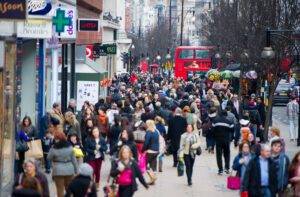
London is dragging down Britain’s productivity growth, with office staff continuing to work from home, according to new figures from the Office for National Statistics (ONS).
The capital experienced the most significant decline in hourly output in 2022, bringing productivity per hour worked to its lowest level since 2009.
From 2019 to 2022, London’s productivity fell by 2.7%, with Wales being the only other region to record a decline. Conversely, the North West of England saw the strongest growth, with productivity rising by 7.9% over the same period.
Economists attribute London’s dwindling productivity to the pandemic’s lasting effects, particularly the shift to remote working. They argue that the lack of in-person coordination and interaction, along with decreased motivation, has hampered productivity growth.
“Working zero days from the office, as seen in the Civil Service, is just not working out,” one economist noted. “There is not the same coordination, not the same interactions, and people do not feel as motivated. There are all sorts of things that do not happen when you are not in the office.”
London’s high concentration of office workers has made it more vulnerable to the impacts of remote working compared to other regions. In late 2022 and early 2023, nearly 60% of London’s workforce was either fully remote or engaged in hybrid working, significantly higher than the 36% in the North West.
A 2022 survey by the ONS revealed that 44% of businesses in London planned to increase levels of home working, the highest in the UK. However, a follow-up survey this month showed this figure had dropped to 29%, indicating a shift back towards office-based work.
Economist Christian Pabst predicts that the return of workers to the office will boost London’s productivity in the coming years. “It took a while for people to see the negative side-effects of remote working. They all liked the positives – no commuting, more family time – but the negatives took time to become clear,” Pabst said. “London took longer to recover from Covid. It is picking up again, and we are now projecting higher productivity growth rates in London than in other parts of the country. Most people have readjusted and are doing three to four days from the office.”
Despite the expected boost from returning office workers, London still faces other challenges that hinder productivity. The lack of affordable housing forces longer commutes, which are costly and time-consuming. Additionally, inadequate transport connectivity and the difficulty of driving in the city exacerbate the problem.
Pabst highlighted these issues: “The lack of affordable housing means productivity growth is struggling. People have to commute for a lot longer. It costs money, it takes time and energy. The lack of housing in areas where it is required has not helped. There are still areas of London which are not well-served by trains or tubes or buses, and people find that driving isn’t easy either. Transport connectivity is a question as well.”
As London continues to navigate the post-pandemic landscape, addressing these challenges will be crucial for improving productivity and sustaining economic growth.
Read more:
London’s Productivity Decline Linked to Remote Work, Reports ONS





